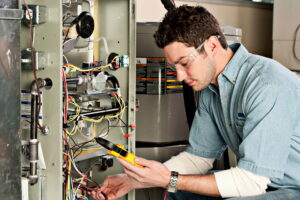If your heater is not working quite like you expect it to, you may be alarmed. After all, you don’t know if it will be an easy, inexpensive fix, or one that costs a lot of money. Fortunately, sometimes you just have a sensor inside of your heater that is malfunctioning and needs to be fixed.
Just give our team a call for furnace repair in Huntington, IN any time something goes wrong. No matter what the problem is, we can help get it figured out and fixed. Keep reading to learn more about times when a sensor inside of your furnace could be causing problems.
What is a Flame Sensor?
This sensor helps to ensure that the gas valve only opens when there is an active flame burning. You don’t want a flame to stay on in your heater when it is not actively completing a heating cycle. This can result in a fire or damage to the inside of your heater. The flame sensor is essentially a safety mechanism, but it also helps to maintain energy efficiency for your heater operation.
Yellow Flames
The flame, sometimes called a pilot light, inside of your heater should always burn bright blue. If the flame is any other color except bright blue there is a problem. If you have a yellow flame or a flame that is any other color, turn your heater off and give us a call. Any flame color other than blue means that your heater is not burning gas efficiently.
There is a buildup of carbon monoxide that can pose risks to your families health in addition to being a fire risk for your home. You definitely want to get this problem checked out sooner rather than later. In fact, we encourage you to turn your heater off completely until we can get the problem checked out.
Rust and Soot
During monthly maintenance when you change out the filter on your heater, it’s also a good idea to take a general look at the unit and see if you notice anything out of the ordinary. Seeing rust or soot can mean that your heater is not working properly. Too much soot buildup is a result of burning gas and efficiently. The same thing goes for rust. Too much carbon monoxide building up inside of your heater can lead to parts corroding.
Energy Costs
Your heater is one of the larger appliances in your home and uses more energy than other sources. If you notice an uptick on your energy costs, there’s a good chance that your heater is the reason. Your energy costs will fluctuate from month to month, but you should never see one sudden spike unless you change your heating settings.
If there’s an unexplained spike on your energy bill or your energy cost month after month without stopping, your heater may be losing efficiency. You can give our team a call and we can check it out to see if anything is wrong. Investing in heater repairs early can help you spend less on energy costs from month to month as well as preventing a complete heater breakdown.
System Age
You also want to consider your heater’s age. A heater can last from anywhere between 15 and 30 years. A lot of that depends on how much your heater gets used and how well it is cared for. If you complete monthly homeowner maintenance tasks diligently and invest in professional maintenance every year, your heater will likely last closer to 30 years.
But once you’re in that 15 to 30 year range, you need to consider that it may make more sense to replace your heater if something is wrong with it. You can always talk to our team about your concerns and we can help you decide if it makes sense to repair your heater or if it’s simply needs to be replaced with a new unit.
True Comfort, True Savings. The team at Colliers Comfort is here to serve you. Schedule an appointment today for furnace service.

